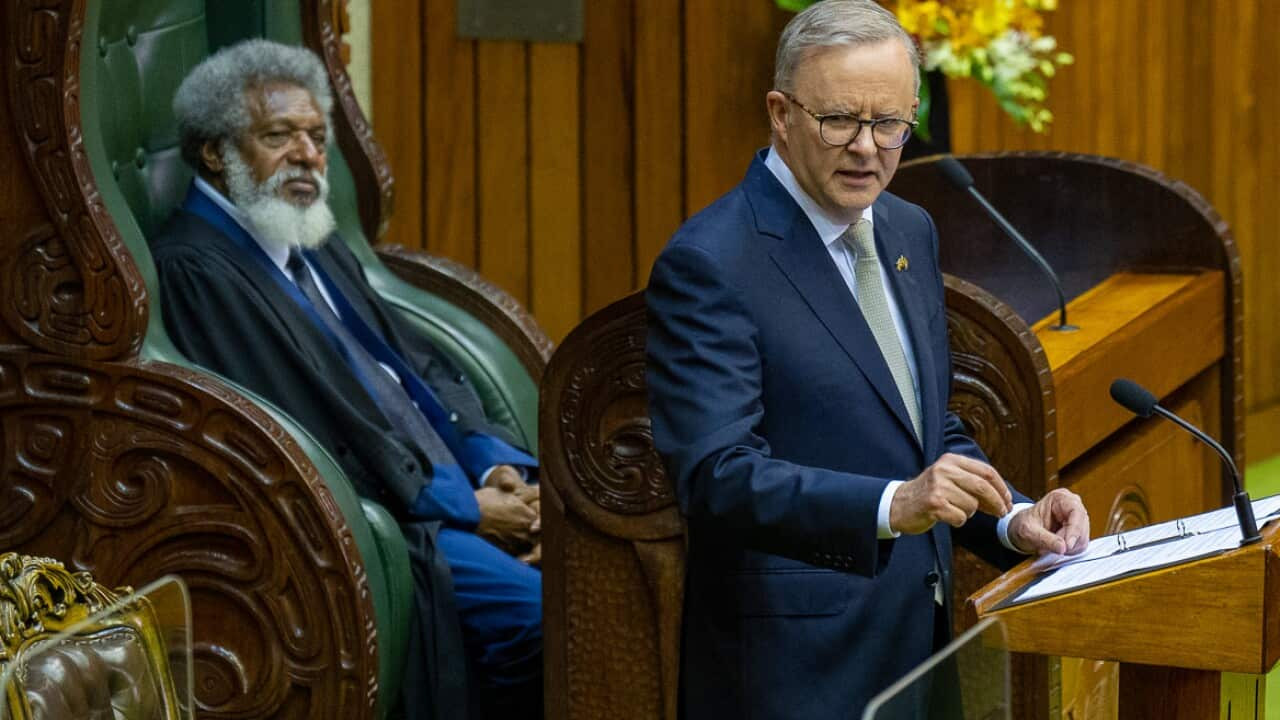KEY POINTS
- Anthony Albanese says Australia's foreign aid budget for PNG is "good for Australia's national interest".
- PNG and Australia have agreed to a bilateral security treaty.
- There will be an expansion of a program allowing people in PNG to work in Australia's agriculture and care sectors.
Prime Minister Anthony Albanese says boosting aid ties with Papua New Guinea is in the national interest after Australia was left in the "naughty corner" under the coalition government.
It comes as the federal opposition says it is disappointing a security deal with PNG was not signed during the prime minister's two-day visit.
Anthony Albanese wrapped up the PNG trip on Friday afternoon - the first for a prime minister since 2018 - getting an agreement to finalise talks on a security pact by the end of April.
Mr Albanese said he "hoped to have a signing in June".
Liberal frontbencher Simon Birmingham said while the engagement with PNG was welcome, it was "disappointing" the treaty was not signed on the visit.
But after returning to Australia, Mr Albanese said his government has been busy repairing relationships since winning the election.
"We were in a position where we were just in the naughty corner, unable to engage in the region," Mr Albanese said on Saturday.
"You can't engage in our region without being concerned about climate change and taking action. That's what we've done."
Mr Albanese said Australia had a national interest in an aid program that lifts the living standards of people in the region.
"That is good humanitarian policy, but it's also good for Australia's national interest," Mr Albanese said.
Australia's official estimated aid budget is about $500 million for 2022-23.

The leaders of PNG and Australia greet rugby league players before a game at Suncorp Stadium in Brisbane in September 2022. The possibility of a PNG-based team in the NRL will be the subject of future talks. Source: AAP / Darren England
The former coalition government began work on the security treaty in 2020 with the signing of the Comprehensive Strategic and Economic Partnership.
The fourth pillar of that partnership was a bilateral security treaty which would not only address defence issues but "other common interests, including crisis and disaster management, enhanced information sharing, strengthened border management, transnational crime, cyber security and land, air and maritime security".
"While it's disappointing that treaty is not being signed on this visit, I look forward to it being signed in the coming months," Senator Birmingham told reporters in Adelaide on Friday.
"We have to make sure we work as comprehensively as possible with these regional partners."
Australia is PNG's largest trade and investment partner and provides the biggest share of development assistance.
During the trip, PNG backed Australia's bid to host the COP31 climate summit in 2026 and Mr Albanese supported a push to scale up the number of skilled and non- skilled PNG workers taking up jobs in such areas as agriculture and the care sector.
As well, a five-year program was agreed to enable more PNG women to take up leadership roles including getting elected to parliament.
Further talks are planned on law and order and policing issues, biosecurity improvements and trade, as well as a possible PNG-based team in the National Rugby League.
Mr Albanese said his PNG counterpart was very enthusiastic for an NRL team.
"I know people in Queensland and NSW are passionate about their rugby league," he said on Saturday.
"But let me tell you this, that the equivalent is the passion that is felt here in Australia for badminton compared with the passion that PNG people hold for rugby league."
Mr Albanese was urged during the trip to do more to tackle climate change, with the Pacific region seen as the frontline in terms of catastrophic damage from more frequent and intense weather events.











